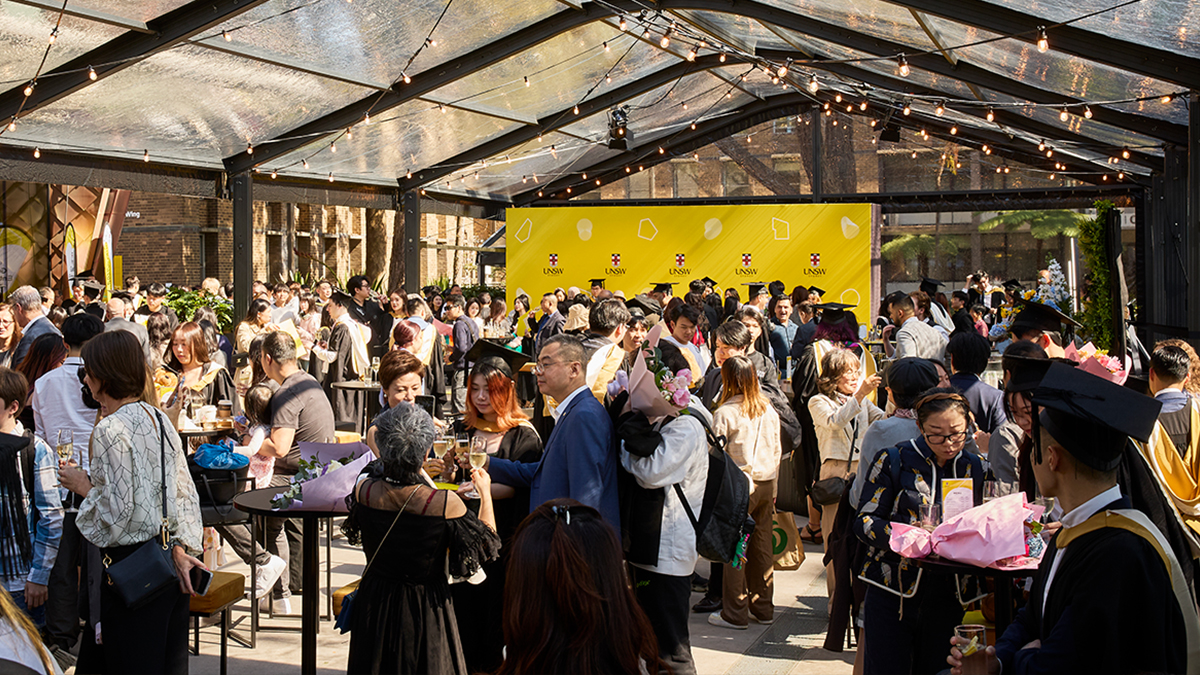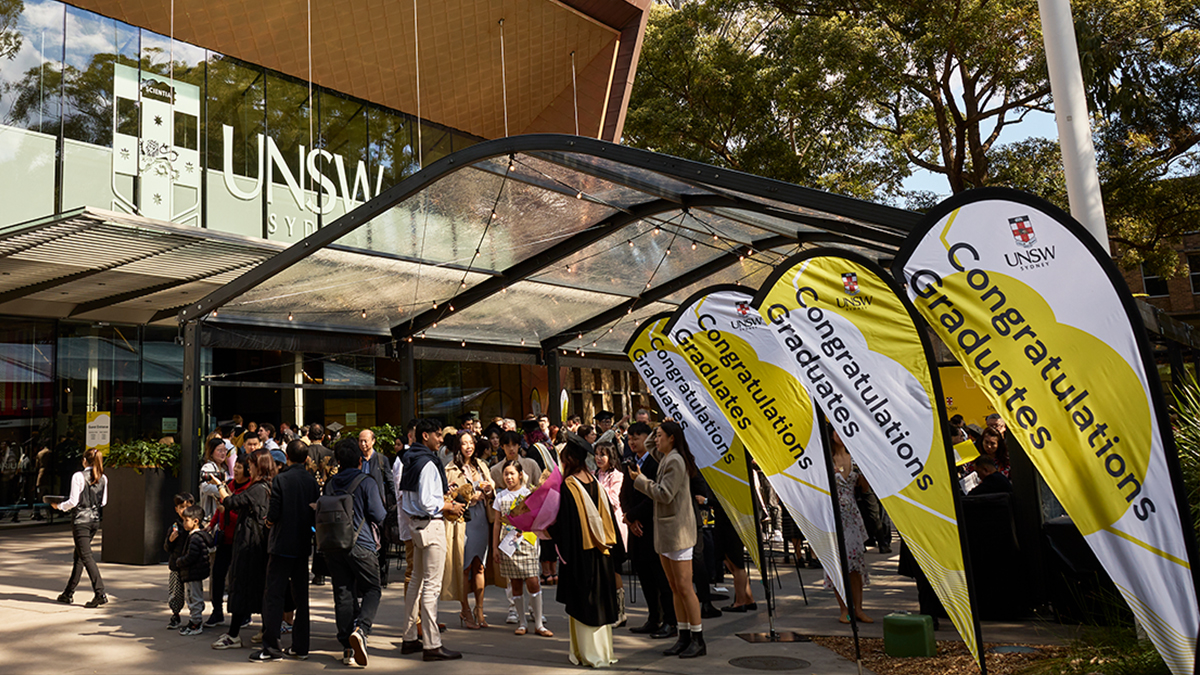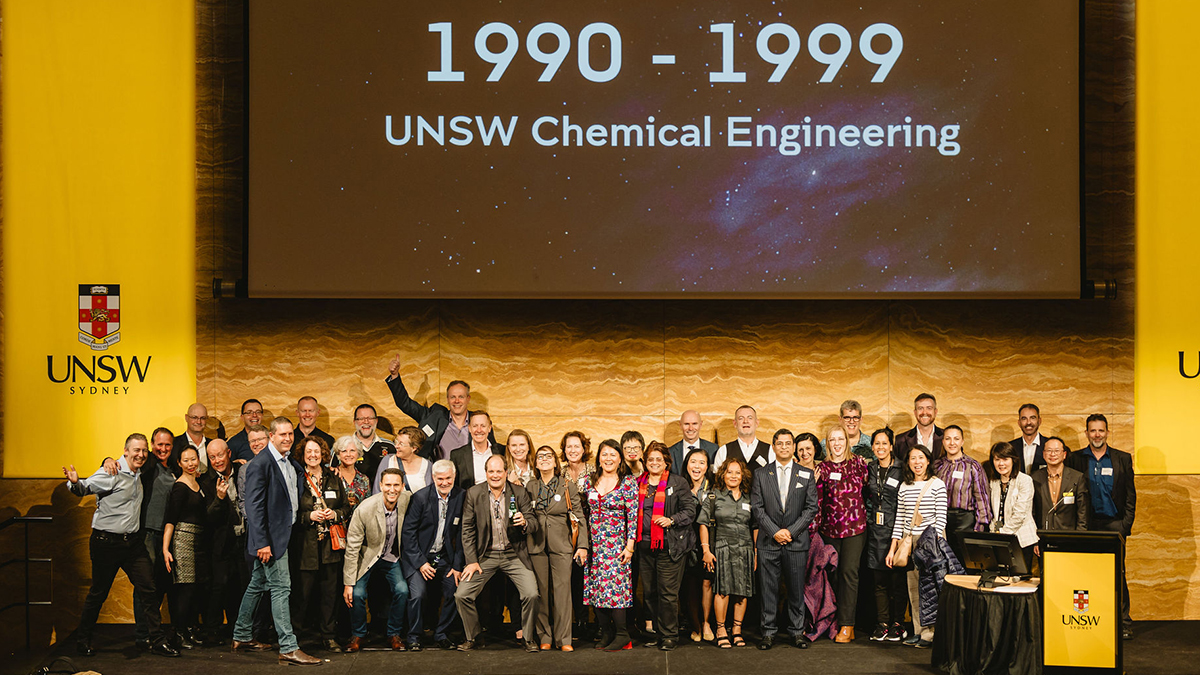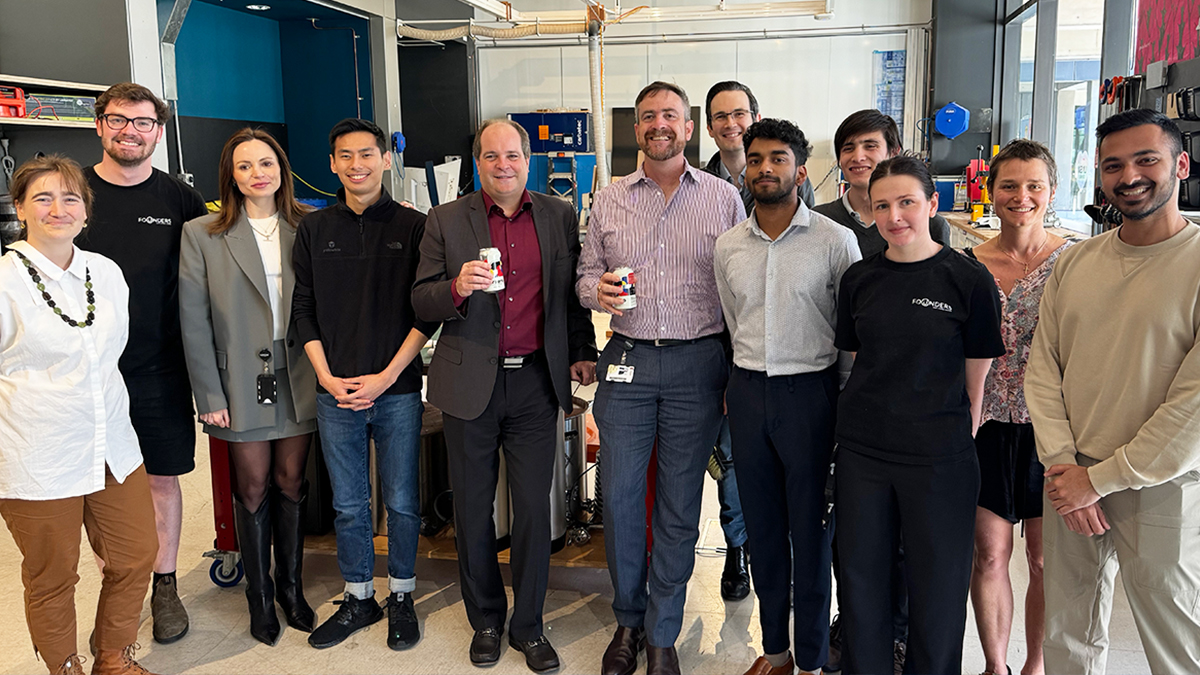
Dear colleagues
I hope, like me, you enjoyed the exultant buzz on campus during the August Graduation Festival. More than 2000 degrees were conferred and 6000 guests welcomed to UNSW across 12 ceremonies. The jubilant atmosphere combined with the magnificent weather to create a truly special celebration for our newly minted graduates.

I’d like to thank the Graduations and Prizes Team who took the graduation celebrations to the next level with enhancements such as the introduction of a Master of Ceremonies, the marquee and Grad Bar serving food and drinks outside the Clancy Auditorium, live music there and on the Library Lawn, and giant yellow signage providing photo opportunities galore.
The vibe was fantastic and a great reminder of why we do what we do – to provide a wonderful student experience and support our graduates to succeed at university and beyond. We hope the Graduation Festival will also encourage our alumni to stay connected with UNSW throughout their lives. This video of the August Graduation Festival captures some of the highlights.
A special part of this Graduation Festival was the honorary doctorate conferred on senior Bidjigal Elder Uncle Vic Simms last Wednesday at the Medicine & Health Graduation Ceremony. Uncle Vic was awarded UNSW's highest honour – an honorary doctorate in recognition of his service to the community. Uncle Vic has devoted his life to professional music and serving community, with a focus on improving the health and wellbeing of Aboriginal people. It was a wonderful occasion, with Uncle Vic giving an inspiring speech. I am very grateful to Uncle Vic for the cultural knowledge and insights he has shared with students and staff at UNSW over many years. Read more on the UNSW Newsroom.
The buzz and excitement on campus continues this week, with Term 3 welcome events for commencing students, and Open Day on Saturday. Last year’s Open Day was our biggest yet, with more than 40,000 prospective students and their families and loved ones visiting UNSW. I look forward to another tremendous event thanks to the generosity, enthusiasm and passion of our dedicated staff and student volunteers.
Federal government's proposed international student cap
You will have seen my email from last Wednesday about the the federal government's proposed caps to the 2025 international student numbers for Australian universities. The government’s proposal is subject to the legislation passing parliament in its current form.
Over the coming weeks we will continue our advocacy for significantly improved and coherent policy as well as less extreme cuts to international student numbers. We will also be having discussions with the federal Department of Education about the specifics of the indicative caps and the modelling and assumptions underpinning the government’s proposal.
I reiterate we are in a relatively strong financial position due to your hard work, careful spending, good management and a recent increase in international students.
AFR Higher Education Summit – and awards!
Congratulations to the four trailblazing UNSW colleagues who won 2024 AFR Higher Education Awards two weeks ago.
Doctors Jake Renzella, Andrew Taylor and Sasha Vassar from the School of Computer Science & Engineering won the Teaching and Learning Excellence category for their innovative and scalable computing curriculum.
Professor Guan Yeoh from the School of Mechanical & Manufacturing Engineering was joint winner in the Research Commercialisation category for developing the world’s first fire-retardant paint. (Take a look at this incredible video demo.)
These awards are very well deserved. They’re proof-positive of the extraordinary educational and research innovations that reflect – and propel! – UNSW’s purpose of positive impact.
Also at the AFR Higher Education Summit, I was part of a panel entitled ‘A rethink of business models’. The session was a great opportunity to dicsuss how Australia’s universities can ensure we are well equipped to fulfil our purpose of public good amid all the disruptions and distractions that are part of a complex, dynamic international operating environment. This was a wide-ranging, stimulating discussion and prescient in the context of current federal government policy proposals and our forthcoming UNSW Strategy: Progress for All.
Setting the foundations for a successful future
If you’ve been following my series about the principles that underpin the forthcoming UNSW Strategy: Progress for All, you’ll know that today I’m writing about ‘Setting our next foundations’. I know we’re not supposed to have favourites, but of the quartet of Strategic Principles, I can tell you that this is definitely one of my top four.
Why?
Because, Setting our next foundations is all about making sure that UNSW has a robust but flexible operating model that will enable us to rise to the challenges of our external environment for the next 10 years and beyond. This is an exciting prospect.
Colleagues throughout our divisions and faculties are already working to ensure our structures, systems (including, but not only IT systems), infrastructure (both physical and digital) and processes are strong, fit for purpose, adaptable and fit for the future.
I mentioned above the discussion at the AFR Summit about business models. This might sound a bit dry but it reaffirmed the conversations we’ve been having at UNSW as we develop the new strategy. Conversations about the dynamic environment we operate in, where politics, geopolitics, regulatory environments, technological advancements, societal structures and associated pressures all have an impact on how we fulfil our function and pursue our vision. But importantly our operating model determines how we navigate these external pressures. Even something as simple as how many forms we fill in before we can complete a task can limit our ability to deliver against our vision.
This principle may be the hardest of all to get right as it will require us to change the way we are used to working, take greater accountability for decisions, stop doing perhaps bureaucratic but easy tasks to free up time for ourselves to drive the core elements of our new strategy.
‘Setting our next foundations’ is a touchstone as we pursue progress for all and fortify a UNSW that is equipped to have a positive impact in a changeable world for generations to come.
To get involved or to follow the progress of our next strategy, please visit unsw.edu.au/strategy.
School of Chemical Engineering – leading the way for 75 years

I had the great pleasure of attending the School of Chemical Engineering 75th anniversary dinner recently. It was a wonderful night celebrating the exceptional achievements of the school, catching up with friends from my cohort (pictured above) and inspiring students and staff, current and former, who are part of the illustrious School of Chemical Engineering. It was very pleasing to have several alumni who graduated in the 1960s and ’70s attend.
It was particularly special to be at the event with my dad, the original Professor Brungs, who has a similar photo with his 1950-1969 cohort and was also Head of School for many years. As I said in my speech on the night, the School of Chemical Engineering has produced not only highly skilled, pioneering engineers and scientists, but people who are deeply committed to making a positive impact on society – leaders and changemakers who are shaping the future of industries, economies and societies in big and small ways.
Supporting student and staff mental health
As you know, the health and wellbeing of students and staff are an absolute priority for all of us. The UNSW Health & Wellbeing team provides mental health-related resources for students and staff including training in mental health first aid, suicide prevention and supporting students in distress. I trained as a mental health first aider a few years ago and found it incredible valuable to me for my day to day responsibilites as well as being able to assist the university community in this regard.
Students and staff who are passionate about creating a culture within UNSW that compassionately supports students and colleagues experiencing mental ill-health can also join the UNSW Mental Health Network, formerly known as the 'Mental Health First Aid @UNSW Network. UNSW Mental Health Network members have access to ongoing mental health and wellbeing-related professional development as well as networking opportunities throughout the year. For more information about mental health training, contact Karen Yuen, Senior Project Manager – Mental Health.
While it’s important to ask the question at any time of the year, next Thursday, 12 September, is the dedicated R U OK? Day. The day is a reminder about the importance of staying connected and having conversations that can help others through difficult times. Find out more about R U OK? Day activities at UNSW.
Startup competition reaches fever pitch

No, that’s not a photo of me drinking on the job, it’s Sörzero a zero-alcohol tea-based beer! The drink, a special UNSW 75th birthday edition, made by UNSW-backed startup Synbiote, aims to showcase the potential of sustainable and circular processes in the brewing industry. I got to sample Sörzero with Mick Farrell, CEO of ResMed, UNSW alum (from my cohort) and long-time UNSW supporter, when we dropped into UNSW Founders at the MCIC Makerspace to meet some inspiring Australian entrepreneurs and try out their new products (pictured above).
The Farrell Family Foundation generously supports the Peter Farrell Cup, a startup pitch competition to help the next generation of entrepreneurs take their ideas to the next level. I’m looking forward to the Peter Farrell Cup Final Pitch next Tuesday, 10 September, it’s always a fantastic evening.
Awe-inspiring 3 Minute Thesis
Speaking of game-changing ideas, this year’s 3 Minute Thesis was, as always, awe-inspiring! It’s a tough job being on the judging panel of a competition with such high-calibre contestants. This year’s winner was PhD candidate Lilly Hatwell from the Garvan Institute of Medical Research and UNSW Medicine & Health, for her presentation on breast cancer treatments targeting the androgen receptor. Lily’s presentation displayed exceptional knowledge in her field of research and communicated it to the audience in a clear and engaging manner. Congratulations to Lily and all of the contestants who demonstrated fascinating diverse and forward-thinking research. I was left feeling incredibly inspired, not only by the research, but by what you can get into the time it takes to boil an egg!
There’s even more Inside UNSW…
- UNSW has engaged in the Australian government’s National Industry PhD Program designed to support staff embarking on an industry-engaged PhD and boost university-industry collaborations.
- The 2024 national Student Experience Survey (SES) for undergraduate and postgraduate coursework students opens on Thursday, 12 September. Please encourage your students to take part.
- UNSW’s Conduct & Integrity Office has recently published the 2023 annual report on Student Conduct and Complaints which provides an insight into the incidence of plagiarism, breaches of the UNSW Code of Conduct and Values, and student complaints.
- This week’s profile is Dr Rebecca Green who teaches graphic design and cartooning and whose research focuses on climate change communication.
Have a great week and I hope to see many of you at Open Day on Saturday, fingers crossed this glorious weather continues.
Best regards
Attila
Professor Attila Brungs
Vice-Chancellor and President
- Log in to post comments
